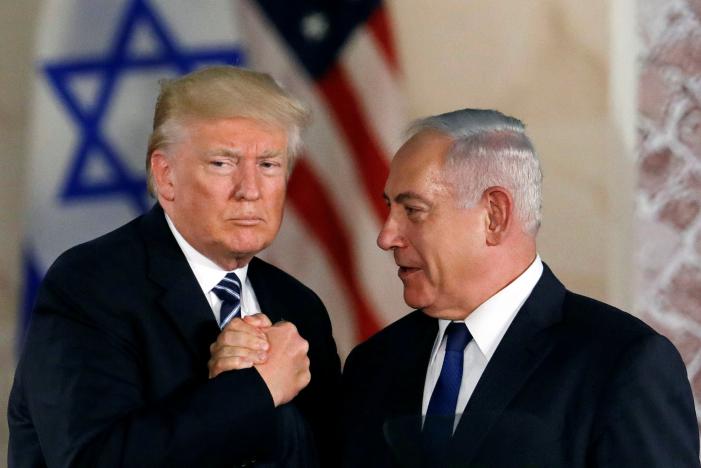As Trump quits Iran deal, Israel should be careful what it wishes for
Be careful what you wish for was the message coming out of some elements of the mainstream Israeli media last night as Donald Trump dramatically pulled out of the Iran nuclear deal.
As Syria blamed Israel for an airstrike near Damascus late last night, and the Israeli Defence Force ordered bomb shelters to be opened in the north of Israel amid a threat from Iranian missiles, the move didn't look so smart after all.
Indeed, the respected daily Israeli newspaper Haaretz published an urgent opinion article saying: '[Israeli prime minister Benjamin] Netanyahu has convinced Trump that leaving the Iran deal protects Israel. But the US walk out means a full-on Israel-Iran war in Syria now becomes far more likely.'
In other words, as is so often the case with Israel, what appears to be in the country's interests, is in fact not.

Netanyahu is key to this self-defeating approach. He has throughout his premiership refused to take any necessary steps towards a peaceful resolution to the conflict with his Palestinian neighbours, with many observers believing he simply does not want peace and instead seeks nothing but the status quo. Yet the majority of Israelis do want a peaceful resolution to the conflict, according to consistent polls. Further, peace in the region is in Israel's interests – including, yes, its security interests – as much as any other group.
For only a lasting settlement with the Palestinians will bring true security to Israel. You can call it enlightened self-interest. Barack Obama, the author of the Iran nuclear deal, recognised this, and made the point several times during years of failed attempts to negotiate with Israel. In the end his relationship with Netanyahu was unprecedentedly bad for a US president and Israeli prime minister. Netanyahu's relationship with Trump is of course better on the surface at least, but whether the regressive step of the US unilaterally recognising Jerusalem as Israel's capital will prove in Israel's long term interests is far from clear.
As Haaretz analyst Chemi Shalev wrote: '[Netanyahu] would have never succeeded were it not for the freak election of an impulsive US president who never lets facts get in his way and who is now sparking even more anxiety throughout the world. It is on this questionable alliance that Israel's security now rests...Netanyahu has taken a risky gamble. He has placed his country in un-splendid international isolation. Netanyahu is not only seen as Trump's main cheerleader but as the chief instigator of a dramatic shift in US policy, one that could ultimately embroil it in another Middle East war...End Times enthusiasts, at least, must be in rapture.'
Netanyahu, of course, is a master of distraction. Iran has remained his priority as he has sought – with considerable success – to divert international attention away from the prospects of an Israel-Palestinian deal. And of course his domestic troubles, including a serious investigation into corruption allegations, mean he is fighting to maintain a premiership under threat.
Israel under Netanyahu appears to be skilled at tactics, but is there a strategy? And what price will Israel pay for these tactics?
As Christian Today noted yesterday, 'Netanyahu has been ramping up the rhetoric against what he calls Iran's nuclear 'lies', while the disastrous prospect of war between the two countries cannot be ruled out. At the same time, Israel is on the West's 'side' in being opposed to the Syrian-Russian alliance, and as ever the role of Saudi Arabia must be factored in, with this dubious western 'ally', too, fiercely opposed to Iran. In this topsy turvy Middle Eastern picture, Saudi Arabia and Israel have been seeking tentatively to develop an unlikely alliance with one another against their common enemy of Iran. There is a distinct danger, then, that Trump and Netanyahu are leading the Middle East into a major war.'
The first skirmishes of that renewed conflict appeared last night. There will, alas, be more trouble to come.











